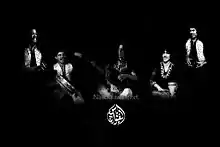Nass El Ghiwane
Nass El Ghiwane (Arabic: ناس الغيوان) are a musical group established in 1970 in Casablanca, Morocco.[1][2] The group, which originated in avant-garde political theater,[3] has played an influential role in Moroccan chaabi (or shaabi).[2] Nass El Ghiwane were the first band to introduce Western instruments like the modern banjo. Their music incorporates a trance aesthetic, reflecting the influence of local Gnawa music.[4] Their music is inspired by ancient North African Sufi poetry, most prominently that of Abderrahman El Majdoub, whose work was a direct inspiration to the band. They are also credited for helping bring a new social movement to Morocco.[5]
Nass El Ghiwane | |
|---|---|
 | |
| Background information | |
| Origin | Casablanca, Morocco |
| Genres | Moroccan |
| Years active | 1971–present |
| Members | Rachid Batma, Hamid Batma, Redouane Raifak, Allal Yaala, Omar Sayed |
| Past members | Abd El-Aziz Tahiri, Abderahmane Kirouche (Paco), Boujemaa Brahim, Larbi Batma |
In film
The band is the focus of music documentary Trances, directed by Ahmed El Maanouni, who described Nass El Ghiwane as Morocco's soul music.[6] Originally released in 1981, it was restored in 2007 by the World Cinema Foundation at Cineteca di Bologna /L’Immagine Ritrovata Laboratory. The film was picked specifically by Martin Scorsese for the World Cinema Foundation's first release and was screened at the Cannes Film Festival in 2007 and at Djemaa el-Fna square in Marrakesh, Morocco.[5] The film has since been distributed by the Criterion Collection.[7]
The band's song "Ya Sah" appears in the film The Last Temptation of Christ and on the associated album Passion – Sources.[8][9] The film's director, Martin Scorcese, credits Nass El Ghiwane for opening a new universe to him.[10][11]
Members
- Abdelaziz al-Tahiri: Founding member, replaced by Abderrahmane Paco en 1974
- Allal Yaala: Founding member, banjo player
- Boujmii Hgour: Singer, poet, composer. Founding member, played with the group until his death in 1974
- Larbi Batma: Actor, singer, percussionist. Founding member, played with the group until his death in 1997
- Omar Sayed: Singer, actor, percussion; founding member[12]
- Abderrahmane "Paco" Kirouche: Singer, composer, played with the group until 1993[13]
- Mohamed Akhdim
- Raifak Redouane: 1991 to 2001
- Mahmoud Saadi: Left the group in the 1970s
- Rachid Batma: Singer, percussionist, since 1996
- Hamid Batma: Since 2000
- Abdelkrim Chifa: Since 2002
Discography
- Assallama
- Hommage à Boudjemma
- Ya bani el-insan
- Ya Nass El Maana
- Wannadi Ana
- Taghounja
- Aali ou Khalli
- Houde Ennaana
- Soubhane Allah
- A lotf Allah el khafi
- Fine ghadi biya khouya
- Lebtana
- Narjak Ana la M'chite
- Ya saielni
- Mahmouma
- Oulad el Aalam
- L'jamra
- Salama
- Live albums
- Nass El Ghiwane Live Olympia 76
- El ghaba – Live
- Echams Etalaa – Live Olympia
- Nass el Ghiwane Live Casablanca
- Nass el Ghiwane Live (feat. Boudjemaa)
- Contributing artist
References
- Badri, Mona. "Nass El Ghiwane: story of a Moroccan Legend". Moroccan World News. Moroccan World News. Retrieved 25 May 2020.
- Eyre, Banning (2001). "Shaabi". Afropop Worldwide. Moroccan Shaabi. Archived from the original on 13 January 2002. Retrieved 18 May 2011.
- Cartwright, Garth. "BBC Radio Awards for World Music 2008". BBC Radio. BBC Radio. Retrieved 25 May 2020.
- Kapchan, Deborah (2009). "Interview: Deborah Kapchan, Gnawa music". Afropop Worldwide (Interview). Interviewed by Banning Eyre. Archived from the original on 26 December 2011. Retrieved 18 May 2011.
- World Cinema Foundation
- Trances at IMDb
- "Trances (1981)". Criterion Collection. Retrieved 18 February 2015.
- "Passion – Sources". Real World Records. Archived from the original on 7 June 2008. Retrieved 18 May 2011.
- Gabriel, Peter. Liner notes. Passion – Sources by Various artists. Real World CDRW02, 1989.
- "" Nass el Ghiwane " racontés par Omar Sayed". Hespress (in French). Hespress FR. Retrieved 25 May 2020.
- ""NASS EL GHIWANE", LE LIVRE OÙ OMAR SAYED RACONTE L'HISTOIRE DES "ROLLING STONES DE L'AFRIQUE", PRÉSENTÉ À RABAT". MAFRIQUE Bulletin Maroc Afrique (in French). Retrieved 25 May 2020.
- Muhanna, Elias (2003). "Folk the Kasbah". Transition. 94 (94): 134. JSTOR 3172475.
- Cumming, Tim. "'The Rolling Stones of Morocco' - Nass El Ghiwane's music of protest". theartsdesk.com. The Arts Desk Ltd. Retrieved 25 May 2020.